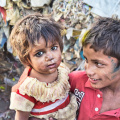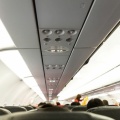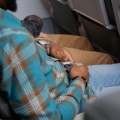How to stay healthy while traveling
 Travel has always been the best medicine for stress, overwork and depression. A change of landscape and new impressions fill with vitality for several months in advance. To achieve the maximum effect, on vacation you need to forget about everything except health. Compliance with a few simple rules will allow you to get only positive emotions from the trip, without heavy memories of hospitals and doctors.
Travel has always been the best medicine for stress, overwork and depression. A change of landscape and new impressions fill with vitality for several months in advance. To achieve the maximum effect, on vacation you need to forget about everything except health. Compliance with a few simple rules will allow you to get only positive emotions from the trip, without heavy memories of hospitals and doctors.Whichever corner of the planet a tourist goes, he must take into account the peculiarities of the local climate and culture. Physical adaptation to new conditions takes some time. Each region has its own viruses and diseases, to which the local population has developed immunity, but visitors do not. While staying in a new place, it is better to spend the first few days in a calm mode and refuse to visit beaches and excursions. The same goes for food: even if the name of the dish seems familiar, it is not known how it was prepared and how the body will react to it.
During any trip, you should remember one simple truth - you need to wash your hands everywhere and always. If there are no sinks nearby, it is best to purchase antibacterial lotions in advance. Any food must also be washed thoroughly. This problem is especially acute in countries such as India, the Philippines, Cambodia, etc. In these regions, human excrement is often used to fertilize the fields. Finished fruits and vegetables are delivered to the point of sale by rafting them along muddy rivers.
It is better to love animals from a distance. Near any Turkish or Egyptian lodge, you can often find little beggars - cats and dogs. In Thailand or India, monkeys are added to them. By their appearance, many tourists make them want to feed or pet them. However, it is worth remembering that these are not pets, but wild ones that can regard attempts at tenderness as a threat. The response will be appropriate. Animals are often carriers of dangerous diseases.
Today, traveling through the deserts or jungle is a common thing. But before traveling to exotic countries, it is better to go to the WHO website, where you can clarify information on common diseases and measures for their prevention in every state of the planet. It is better to get vaccinated at home than catching the deadly virus while traveling.
The bereaded person is protected by the insurance policy. In most cases, if the tourist has a little common sense and a head on his shoulders, then the insurance will lie somewhere at the bottom of the bag for the rest. But if an accident suddenly occurs, then this "piece of paper" can not only save a round sum, but also save your life. Finding funds urgently and sending them to another country is not an easy task, and no one will undertake serious treatment without a guarantee of payment.
Last news
 14.02.2023
Vyborg - a unique monument of the knightly Middle Ages
14.02.2023
Vyborg - a unique monument of the knightly Middle Ages
Vyborg is a city with an ancient history, located at the Russian-Finnish border, a hundred kilometers from St. Petersburg. For seven centuries now, its cobbled streets have preserved the spirit of the ancient European era of knightly tournaments. This unique corner of Russia can be called a living monument of the history of human civilization.
 10.02.2023
How to behave during turbulence to save your nerves and avoid injury. Part 2
10.02.2023
How to behave during turbulence to save your nerves and avoid injury. Part 2
In the last article, the main types of turbulence, the reasons for its occurrence, as well as answers to questions why you should not be afraid of it, were considered. This article will give recommendations on how to behave during a possible "shaking". As well as the actions of passengers that will prevent possible injuries and other negative consequences of turbulence, which can be taken even before the announcement of the danger by the stewardess.
 07.02.2023
How to behave during turbulence to save your nerves and avoid injury
07.02.2023
How to behave during turbulence to save your nerves and avoid injury
More than 30 people flying on a Hawaiian Airlines plane were recently injured due to being caught in a zone of severe turbulence. Such events are extremely rare. However, airline crews take this possibility very seriously. Therefore, passengers should also know what this phenomenon is and how to behave when they find themselves in turbulence.